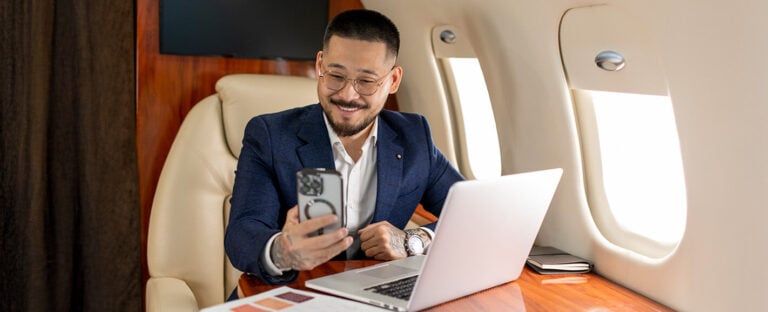People are increasingly seeking private jet travel, and this and other aviation trends have been evident since 2020. Furthermore, private jet sales continue to increase steadily, and this is due to a growing number of travelers who require the convenience, security, and privacy benefits of private aircraft.
However, this undoubtedly leaves many with the predicament of deciding between leasing a private jet and buying an aircraft outright. To help you reach an informed decision on the matter, we’ve compiled a comprehensive breakdown of the pros and cons of leasing and buying a private jet. There are several benefits and advantages to each, as well as valid considerations and disadvantages, as outlined here.
Pros and Cons of Leasing a Private Jet
Leasing a private jet is quite similar to fractional private jet ownership, which is another possible way of enjoying the benefits of private jet travel. Private jet leasing means a lower initial capital outlay, and the omission of the significant upfront investment makes this option more affordable and, for specific use cases, also the most logical.
Although you will still pay a deposit and monthly lease payments as well as other expenses such as an occupied hourly rate and a monthly management fee, private jet leasing offers less financial commitment than purchasing one. Additionally, you’ll typically lease for a contractual period, after which you have the luxury of walking away without the financial obligations associated with the jet.
Private jet leasing is appealing for various reasons, but it also means navigating the potential disadvantages before deciding. The pros of leasing a private jet lean into cost-effectiveness and convenience, as well as the following:
- Leasing offers financial viability with less upfront costs.
- Leasing improves overall flexibility, including financial, flight frequency, and leasing packages.
- Leasing may decrease specific responsibilities such as management and maintenance.
- Leasing offers a short-term commitment, after which you can sign another lease or wait until the need arises again.
- Leasing could mean access to newer and well-maintained aircraft.
The potential cons to leasing a private jet are worth considering, and some of them are outlined here:
- You could experience higher long-term costs than an outright purchase
- You are affected by the leasing company and its operational and financial stability
- You have limited access to personalization or customization, like aircraft interior choices
- You are bound to the rules, regulations and restrictions and any contractual obligations in the lease agreement
Types of Private Jet Leasing
If you decide that leasing a private aircraft is the optimal choice for you and your travel needs, then you should be aware that there are two primary forms of private jet leasing:
Dry Lease
Dry leasing is more common as it allows for greater personalization, and you will also typically lease the aircraft for a longer period than wet leasing. Dry leasing is often the more affordable option. However, in this agreement, you will have your own crew and may be responsible for maintenance and insurance expenses. This option provides greater flexibility and lower initial costs.
Wet Lease
Selecting wet leasing is ideal for when you want a more comprehensive and hassle-free service as the jet includes insurance and maintenance as well as a crew that is familiar with the aircraft. This option is also preferable if you require quick deployment with all the essentials, such as crew, maintenance and other coordination already taken care of. This inevitably translates to hire monthly payments and potentially more stringent requirements and regulations, including both the lease agreement and the Federal Aviation Administration (FAA).
There is also the option for current owners to take advantage of a sale-leaseback, which is the process of selling one’s private jet to a lessor with the agreement that they will then lease it back to the original owner.
Pros and Cons of Buying a Private Jet
There are several factors that you will need to consider if you want to buy a private jet. These include the type of trips you wish to take and where, the aircraft range and size, its level of comfort and amenities, and if you purchase new or pre-owned. This process can be complex, which makes it that much more essential that you partner with a trusted jet acquisition service to help you find the best aircraft for your needs.

Deciding to purchase a private jet is a strategic move toward unparalleled convenience and control in your air travel. There are also several considerations when buying a jet and potential disadvantages that accompany the benefits of increased personalized travel.
The following are a handful of pros that apply to owning a private jet:
- Buying offers certain tax benefits, such as tax credits in certain states and the Tax Cuts and Jobs Act (TCJA), which extends until 2025.
- Buying means that once it is paid off, you retain the fixed asset, which you can use either for personal or business use and to create a revenue stream through leasing it.
- Buying also allows you to take complete control over the aircraft regarding personalization, usage, customization, and scheduling.
- Buying offers the benefit of traveling without worrying about lease agreement conditions.
- Buying might be more cost-effective than a long-term lease agreement, depending on the frequency of use.
- Buying gives you the benefit of being able to predict your monthly and yearly costs.
The cons of owning a private jet may include:
- You face a hefty upfront investment
- You take on additional responsibility and ongoing expenses, like hangar fees, insurance, maintenance, jet fuel, and crew salaries
- You must factor in wear and tear, which causes the aircraft value to depreciate, bringing the potential resale value down
Private Jet Financing
There are different avenues and reasons for private jet acquisition. These options include:
- Private jet financing: Financing offers a structured payment plan that makes private jet ownership more accessible and is a way of avoiding excessive upfront capital investment.
- Private jet fractional ownership: Fractional ownership allows multiple individuals or even businesses to share ownership of the aircraft — dividing the ongoing costs and the usage rights.
You’ll also want to review the option of chartering your aircraft when not in personal use, as it is one of the key practices to reduce jet ownership expenses.
Choose Latitude 33 for Your Private Jet Charter, Purchase, and Management
Here at Lattitude 33 Aviation, we have a range of premium services. Whether you’re looking to charter a flight, want to take the first step toward private jet ownership, or wish to enquire about executive jet management, we are ready to serve you.
For professional insight and personalized assistance with private jet chartering and aircraft sales and acquisitions, contact Lattitude 33 Aviation today.






Comments are closed.